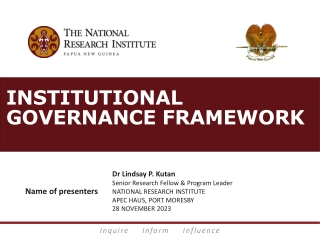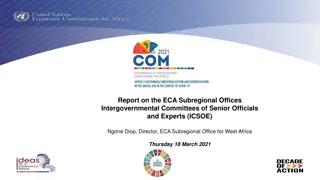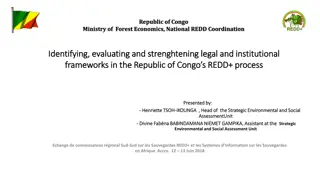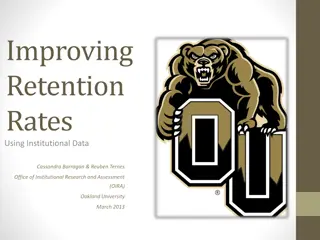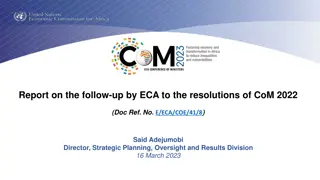
Integrated Statistical Law Importance and Framework in Development Workshops
Explore the importance of updating statistical laws for National Statistical Systems (NSS) within the United Nations Development Account workshops. Enhance NSS status, access to data, and funding for sustainable development.
Download Presentation

Please find below an Image/Link to download the presentation.
The content on the website is provided AS IS for your information and personal use only. It may not be sold, licensed, or shared on other websites without obtaining consent from the author. If you encounter any issues during the download, it is possible that the publisher has removed the file from their server.
You are allowed to download the files provided on this website for personal or commercial use, subject to the condition that they are used lawfully. All files are the property of their respective owners.
The content on the website is provided AS IS for your information and personal use only. It may not be sold, licensed, or shared on other websites without obtaining consent from the author.
E N D
Presentation Transcript
ECA United Nations Development Account 10th Tranche Statistics and Data Sub-Regional Workshop on Integration of Administrative Data, Big Data and Geospatial Information for the Compilation of SDG Indicators Analysis of Country Responses to Analysis of Country Responses to the Assessment Questionnaire: the Assessment Questionnaire: Institutional Framework, Resources and Management Institutional Framework, Resources and Management Addis Ababa, Ethiopia 23-25 April 2018
1. INSTITUTIONAL FRAMEWORK 1. INSTITUTIONAL FRAMEWORK Importance of Statistical Law and the need for making it up-to-date The purpose of statistical law is to provide a strong reference for developing a solid legal basis for the functioning of a NSSand the production of high quality official statistics. UN Fundamental Principles of Official Statistics Implementation guideline recommends the statistical laws and regulations to be modern and up-to- date. One of the Key Actions of the Cape Town Global Action Plan for Sustainable Development Data (under Innovation and modernization NSSs) is to Promote the revision of statistical laws and regulatory frameworks, where necessary, consistent with the Fundamental Principles of Official Statistics.
Revisions of statistical laws will: Enhance the status, independence and coordination role of NSOs; Strengthen their access to data, including enhanced data sharing across the NSS, and thereby their ability to more efficiently respond to emerging data and statistical needs; Develop a mechanism for the use of data from alternative and innovative sources within official statistics; Improve transparency of, and public access to, official statistics; Strengthen the availability of sustainable funding for NSSs.
Year in which the Statistical Law was Enacted or Updated 1994, UN Fundamental Principles of Official Statistics 11 6 2 1 1 1960-69 1970-79 1980-89 1990-99 2000-09 AFTER 2010 2015, SDGs 2000, African Charter on Statistics
Coverage of Statistical Law The statistical law shouldcover the entire NSS, i.e. the activities of the NSO as well as that of other organizations involved statistics. It should also be comprehensive and provide sufficient detail to ensure that roles and responsibilities are properly understood. Only NSO, 3 NSO and some other producers of Official Statistics, 10 in official All Producers of Official Statistics, 9
Access and use of data for statistical purposes In all the 22 countries, the specific roles and responsibilities of the NSO are explicitly stated either in the national statistical law or in one of its by-laws (e.g. decree or regulation). In 19 out of 22 countries, the NSO is allowed by law to use, free of charge, administrative data for statistical purposes. In 19 out of 22 countries, Ministries and Agencies (based on their respective legislation and rules) are allowed to provide administrative data to the NSO for statistical purposes.
Collaboration, Cooperation and Partnership For the development of a nation, different reliable and standard statistics are to be supplied regularly. It needs to bring about co-ordination for processing of collected statistics. In addition, these collected statistics are to be standardized. The integration of modern geospatial information management systems within mainstream statistical production programmes is a powerful means to enhance data inter-operability and usability for policy-decision making at different levels of aggregation. In 15 countries, a user advisory body (e.g. Statistical Council) represents important user groups within and outside the government and the administration in place. In only 7 countries, the National Mapping Agency/Geospatial Authority is represented in that advisory body.
2. RESOURCES AND MANAGEMENT 2. RESOURCES AND MANAGEMENT Enhancing IT infrastructure in 15 countries, IT infrastructure and software for production of statistics is regularly updated to meet current and future statistics needs. One NSO upgraded from using Paper Assisted Personal Interviewer (PAPI) to Computer Assisted Personal Interviewer (CAPI) while conducting Surveys. The challenges are inadequate resources to match the quick changes in technology advancements, including procuring licensed software.
Research Units within NSO Research unit within NSO provide technical assistance to other units within the NSO, covering various quality and methodological aspects of the processes needed to produce high quality official statistics. 12 NSOs have centralized IT and methodological/research units within the NSO that provide for pooling resources and investments. In 10 of these 12 countries, such units also serve for identification of innovation/modernization potential. These same units also provide similar services to other producers of official statistics.
Capacity building (Staff skills) In 18 countries, staff skills are regularly updated with regards to new technologies, tools and methodology. Conducted through: Local & international trainings and workshops on new technologies emerging issues on statistics. (E.g. trainings on CAPI, web designed, system administration). administrator, and database
Infrastructure for efficient and secure data sharing, linking and cross-checking Only 12 NSOs have a technical infrastructure to enable efficient and secure data sharing between the NSO and other members of the NSS, as well as linkages and cross-checking of administrative, geo-spatial and other innovative data sources.
Plans to Improve IT Infrastructure of NSOs Expanding infrastructure of STCs to enhance statistical activities. This may include equipping STCs with a computer lab , a GIS Lab etc. Developing a common platform for data sharing for both producers, and strengthening data Ecosystem Continuous capacity building to equip the staff with the necessary knowledge and skills. Developing and implementing ICT Strategy within the NSS including training and human resources. Modernize the data collection processes and move away from PAPI.
ECA Thank You

